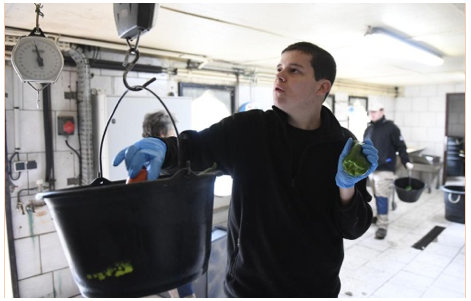CommentsLABOR DAY VISIONS--As we approach Labor Day, I'd like you to meet the Neurodiversity Workforce Brigade. The Brigade employs tens of thousands of adults with neurological conditions that often are impediments to mainstream employment, primarily autism, severe ADHD and other serious learning and mental health conditions.
All of its members previously were unemployed. Most were on one of the government benefit programs, Social Security Disability Income (SSDI) or Supplemental Security Income (SSI). (Photo above: Romain, an adult on the autism spectrum prepares food for animals at the zoo of Pont Scorff on March 29, 2017.)
The Brigade employs them to provide useful public service employment. Their work builds on their strengths and abilities in different areas, including their attention to detail, focus and loyalty.
- Some of them provide services to the elderly. They serve as companions and aides to residents of long-term care facilities. They provide assistance to the nursing staff, dining hall staff and maintenance staff.
- Some are engaged in parks and urban greening projects. They use their skills to plant and maintain our local parks, to engage in tree care and landscape care, and to help with habitat restoration.
- Some serve as museum and cultural center guides and docents and are able to draw on their memory skills.
- Some work at the motor vehicle department to reduce backlogs and at public safety departments to speed up response times.
They are paid at minimum wage, but what is most important is that they're paid. Their efforts are not being taken for granted — as is often the case in adult day care volunteer activities.
Though Brigade members work in different locations, they come together each week in mutual support, helping each other with work and life challenges that arise. Outside work, they are no longer isolated. They band together in their own social networks, going to baseball games or to a restaurant or getting together to go bowling or hiking. They volunteer with local churches and synagogues.
From its origins in the late 1800s, Labor Day has called forth visions of new employment structures. The Neurodiversity Workforce Brigade is such a vision for 2017, but it is also more. Various elements of the Brigade are quietly arising in different locations. The ideas and energy that will propel it are operating throughout the United States.
Here in Northern California, several pilot Brigade projects are in stages of development. In Sacramento, Dr. Lou Vismara, a prominent cardiologist turned full time autism employment activist, is testing a small public service employment pilot employing adults with autism in long term care facilities, starting with dining hall assistance, facilities maintenance, and care staff assistance. In these work settings often portrayed as dreary and depressing, Dr. Vismara envisions connections arising between adults with autism and seniors — connections of friendships and mentoring — through the daily interactions.
(Michael Bernick writes about emerging employment structures, policy and law. He is an occasional CityWatch contributor.)
-cw















